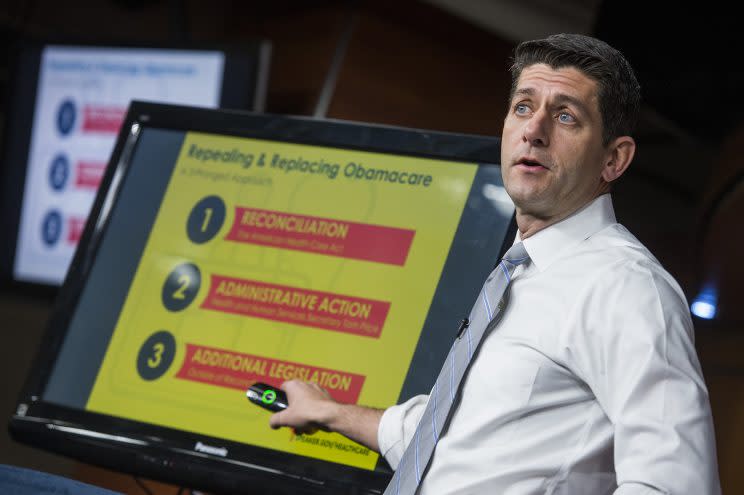CBO: 14 million people would lose coverage next year under GOP health care plan

The Congressional Budget Office’s report on the American Health Care Act estimates that if the GOP plan passes, 14 million more people would be without health insurance in 2018 than under Obamacare, and 24 million more would be uninsured by 2026 than under the current law.
The 28-page report released Monday afternoon was bad news for Republicans who had been preemptively attacking the office, anticipating that it would release a scoring critical of their proposed Obamacare replacement plan. The report also said that while the AHCA would substantially decrease premiums for younger policyholders, it would substantially raise them for older Americans.
Related: Five key numbers from the Obamacare repeal bill’s CBO analysis
“This report confirms that the American Health Care Act will lower premiums and improve access to quality, affordable care,” House Speaker Paul Ryan, R-Wis., said in a statement. “CBO also finds that this legislation will provide massive tax relief, dramatically reduce the deficit, and make the most fundamental entitlement reform in more than a generation.”
The CBO was created in 1974 to be a nonpartisan analyst of proposed legislation, providing independent reports on the potential economic impact of new bills. The current CBO director is Keith Hall, who was appointed in 2015. Hall served on President George W. Bush’s Council of Economic Advisors and saw his selection rankle some Democrats due to a 2013 op-ed article in which he criticized Obamacare and proposals to raise the minimum wage. The CBO has strict rules to limit financial conflicts of interest and political activities by its employees.
Generally, a bill receives its CBO scoring before members vote, but Republicans in the House had already pushed the AHCA past some legislative hurdles before the report was available.
“I don’t think the House should have proceeded without a CBO estimate,” said Sen. Tom Cotton, R-Ark., on Sunday. “At the same time, the director of the CBO is not Moses. He doesn’t come down from the mountaintops with stone tablets. They’re human like the rest of us. They can make mistakes. But they do provide an important amount of information and analysis that allows senators and congressmen to make informed choices.”
The report generally echoes the Brookings Institute’s findings from last week, likely making the bill a tougher sell to constituents and lawmakers who are on the fence. Brookings, a liberal-leaning think tank, projected that the CBO would find that at least 15 million people would lose coverage if the AHCA were passed. This is in stark contrast to President Trump’s campaign promises.
“I am going to take care of everybody,” said Trump in a September 2015 interview with “60 Minutes.” “I don’t care if it costs me votes or not. Everybody’s going to be taken care of much better than they’re taken care of now.”
Last week White House press secretary Sean Spicer previewed the messaging that Republican supporters of the bill would turn to in anticipation of an unflattering report: “If you’re looking at the CBO for accuracy, you’re looking in the wrong place.”
Ryan, appearing on “Face the Nation” Sunday, preemptively dismissed the CBO’s conclusions.
“The one thing I’m certain will happen is CBO will say, well, gosh, not as many people will get coverage,” said Ryan. “You know why? Because this isn’t a government mandate. This is not: The government makes you buy what we say you should buy, and therefore the government thinks you’re all going to buy it. So there’s no way we can — you can compete with on paper a government mandate with coverage.”
When pressed on how many people would lose coverage, Ryan said, “I can’t answer that question. It’s up to people.”
White House budget director Mick Mulvaney was also making the rounds of the Sunday shows, attacking the CBO on ABC News.
“If the CBO was right about Obamacare to begin with,” said Mulvaney, “there would be 8 million more people on Obamacare today than there actually are. So I love the folks at the CBO — they work really hard, they do — but sometimes we ask them to do stuff they’re not capable of doing, and estimating the impact of a bill of this size probably isn’t the best use of their time.”
The CBO projections for coverage under the Affordable Care Act were inaccurate, partly because 19 states opted out of expanded Medicaid — which could not have been predicted at the time — and partly because the agency predicted that more employers would drop their own health insurance plans than actually did.
While the CBO wasn’t perfect in its Obamacare scoring, it wasn’t too far off the mark. After the Supreme Court ruled that Medicaid expansion was optional for states, the office predicted that 89 percent of Americans below age 65 would have insurance in 2016. According to data from the Center for Disease Control, the number was actually 89.7.
When asked during Monday’s press briefing whether CBO numbers were legitimate or not, Spicer said, “That’s not my determination to make.”
Douglas Holtz-Eakin, who ran the CBO under President George W. Bush and worked on Mitt Romney’s 2008 campaign, dismissed the criticisms.
“The office is genuinely nonpartisan and seeks to make sure its estimates are grounded in research literature,” Holtz-Eakin told Talking Points Memo. “Both Republicans and Democrats have led the office, and the work is always of the same high quality.”
Read more from Yahoo News:
Conway defends Trump claim by citing wider domestic surveillance
‘It’s merciless’: Democrats focus on seniors while attacking GOP health bill
Rep. King touts ‘Western civilization’ while defending incendiary immigration tweet
Photos: The ‘I Don’t’ Project — A look at child marriages in India, Ethiopia and Brazil



